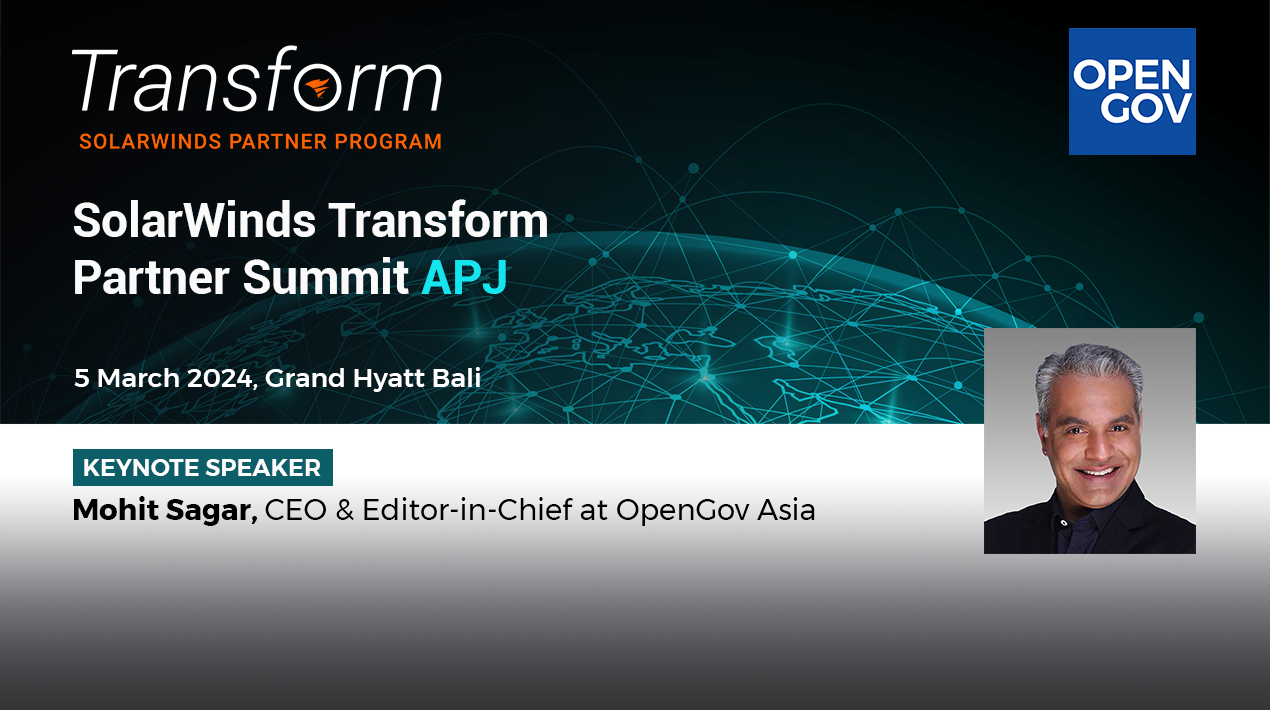
|
Getting your Trinity Audio player ready...
|
The SolarWinds Transform Partner Program at the Grand Hyatt Hotel in Nusa Dua Bali on 4-6 March 2024 emerged as a crucial forum for it’s business partners and the whole APJ team to explore the dynamic digital landscape, particularly amidst ongoing global disruptions. The event attracted senior executives from the SolarWinds global team to complement the APJ’s team.
The event provided an opportunity for OpenGov Asia to share invaluable insights on “Digital Terraforming: Reshaping APJ’s Landscape in the Digital Age”.
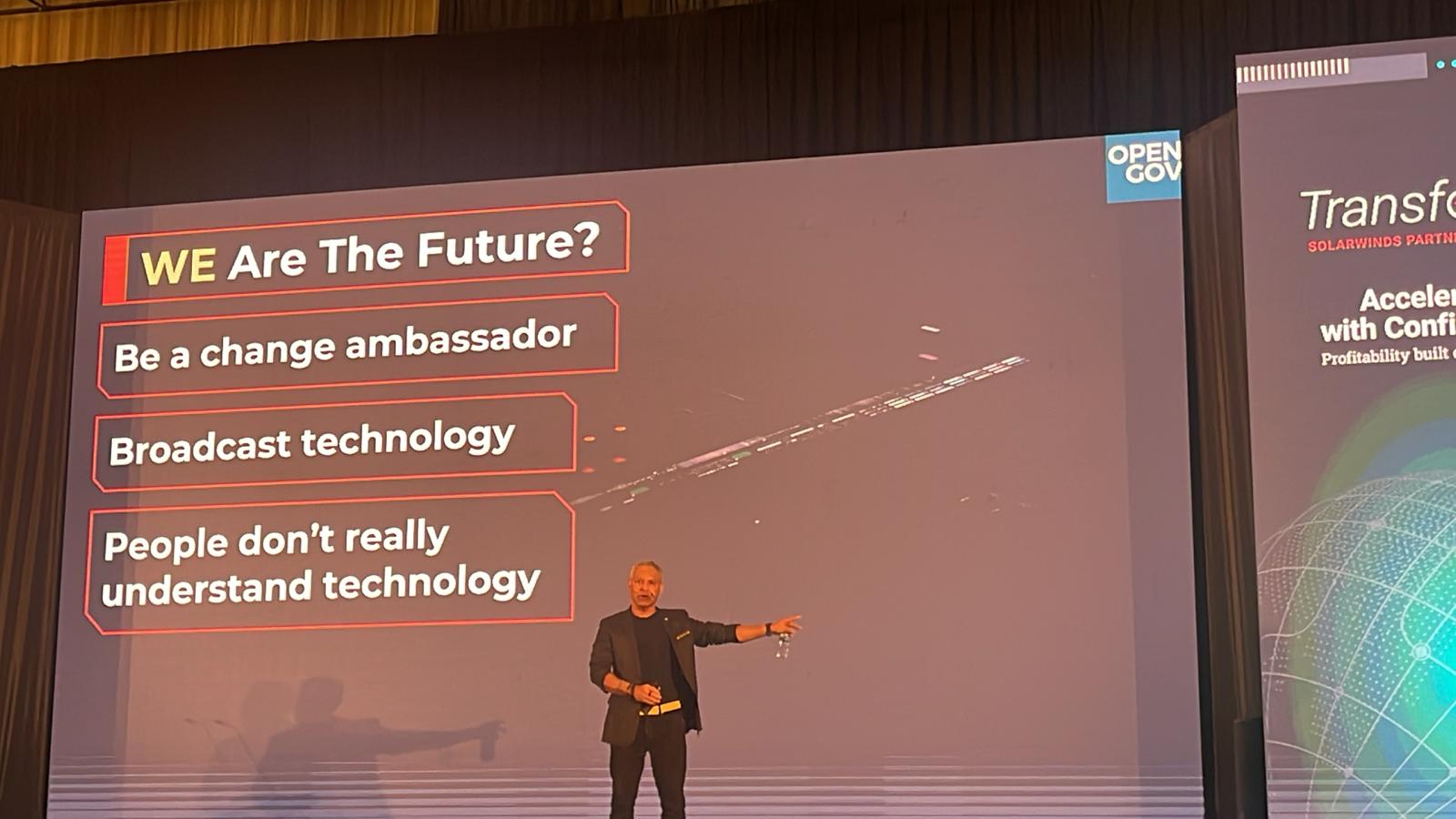 Mohit Sagar, CEO and Editor-in-Chief of OpenGov Asia delivered a keynote address that set the tone for the event. Recognising the transformative potential of technology, particularly in reshaping the economic terrain of APJ, he elaborated on crucial concepts such as digital terraforming socio-cultural transformation, environmental resilience in the digital age and navigating ethical and regulatory frontiers.
Mohit Sagar, CEO and Editor-in-Chief of OpenGov Asia delivered a keynote address that set the tone for the event. Recognising the transformative potential of technology, particularly in reshaping the economic terrain of APJ, he elaborated on crucial concepts such as digital terraforming socio-cultural transformation, environmental resilience in the digital age and navigating ethical and regulatory frontiers.
In recent years, the transformative power of technology has transcended geographical boundaries, democratising access to information, resources, and opportunities on a global scale. This digital revolution has become a stimulus for innovation and growth, empowering nations to leverage their talents and resources in unprecedented ways.
As a result, more nations are increasingly better positioned to thrive in the digital era, with technology playing a pivotal role in reshaping the global landscape and levelling the playing field for all.
Mohit acknowledged the disruptive impact of COVID-19, emphasising how it accelerated the adoption of digital technologies across industries. The pandemic served as a catalyst, compelling businesses to swiftly embrace digital solutions to adapt to changing circumstances and navigate unprecedented challenges, thereby restructuring traditional business models and practices.
“COVID-19 accelerated digital transformation across sectors and industries. Citizen services, healthcare, remote work tools, e-commerce platforms and video conferencing witnessed significant adoption and transformed life and work,” Mohit acknowledges. “Companies that embraced digital technologies were able to navigate the challenges posed by the pandemic more effectively, showcasing the power and potential of the technology.”
The APJ region, like other parts of the world, boasts numerous positive factors, ranging from burgeoning internet penetration and widespread mobile adoption to the emergence of tech hubs and government initiatives driving AI and automation. Of course, alongside these prospects come pressing concerns such as data privacy and security, influenced by the shift to cloud computing, remote work and rapid urbanisation.
In the face of these challenges, the evolution of technology emerges as a pivotal factor, driving tech innovation, enhancing infrastructure, and facilitating skill upgrades that collectively shape the digital landscape.
Be that as it may, the world continues to grapple with volatility, uncertainty, complexity, and ambiguity. Escalating geopolitical tensions and supply chain disruptions emanating from ongoing conflicts mean there are unprecedented challenges compounded by political confusion and an ever-shifting global landscape.
In fact, Mohit is strongly convinced that 2024 and the following years are poised for the Asia-Pacific-Japan region to lead the charge in the upcoming economic resurgence. While other parts of the globe may be struggling, the region is not.
“America may sneeze and Europe have a cold, but the Asia-Pacific-Japan region remains robust. Despite the S&P500 hitting record highs, its ascent has been largely driven by the prowess of seven tech giants – Meta, Alphabet, Amazon, Microsoft, Apple Tesla, and Nvidia. Now is the time for APJ to shine, and we must be prepared to seize the opportunity.”
However, there was a hint of concern in his tone. While high connectivity and growth hold immense promise, they may also carry a price tag, and it’s imperative for the world to remain vigilant and mindful of this reality.
“Beyond a doubt, the next cyber phase of the Russia-Ukraine war will echo in Asia[i],” he says, “The impact will be profound, but only 49% of organisations globally have a business continuity plan[ii].”
The growth in the region can be credited to most businesses being focused on customer needs. Personalisation, using a vast amount of digital tools at speed, has seen growth in the region. But who is monitoring all these tools? Have businesses bolted too many without having visibility across their entire network?
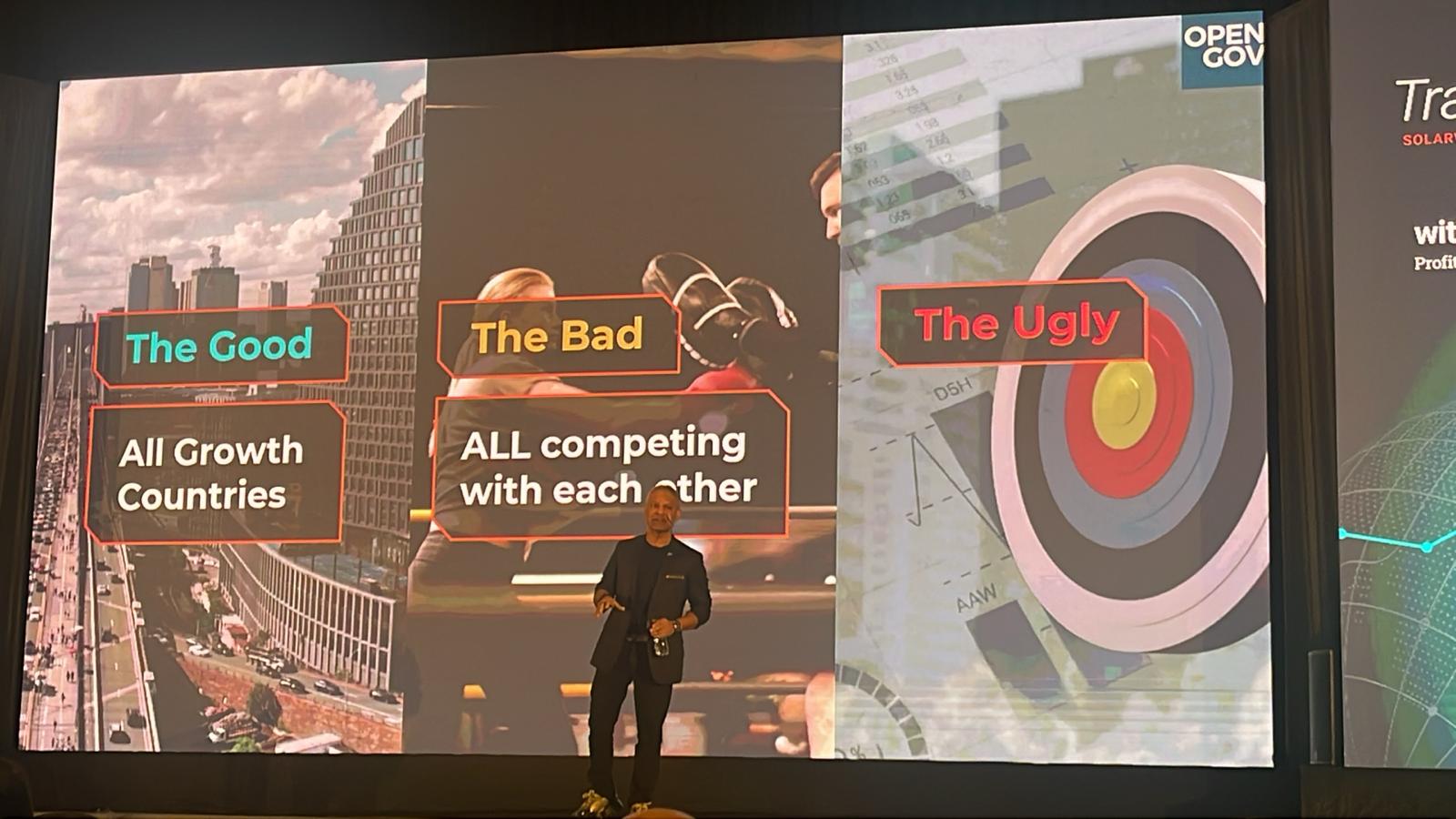 In this milieu, technologies such as AI, robotics, blockchain, and IoT devices are playing pivotal roles in reshaping industries, enhancing efficiency, and adapting to new challenges, illustrating the profound impact of technology on our response to global crises.
In this milieu, technologies such as AI, robotics, blockchain, and IoT devices are playing pivotal roles in reshaping industries, enhancing efficiency, and adapting to new challenges, illustrating the profound impact of technology on our response to global crises.
AI continues to revolutionise enterprises with applications like chatbots, disrupting traditional workplace dynamics and significantly enhancing customer service. Moreover, in healthcare, AI-powered disease prediction systems are transforming early diagnosis and treatment strategies, significantly impacting patient outcomes and public health.
Additionally, AI’s integration with the Internet of Things (IoT) is turning homes and cities into smart hubs, offering residents improved efficiency and convenience. This interconnectedness enables seamless communication and data sharing among devices, fostering a connected ecosystem for enhanced living experiences.
Similarly, in the finance industry, Mohit observes, the pivotal role of blockchain technology is revolutionising finance and supply chain management, “Blockchain’s decentralised and secure nature is streamlining transactions, reducing fraud, and improving transparency in these sectors.”
While acknowledging the transformative potential of AI and blockchain, Mohit also highlights the sustainability and regulatory challenges intertwined with these innovations. Expressing concerns about the environmental impact of AI and IoT devices, he emphasises the imperative for robust regulations to safeguard user data and ensure ethical AI development.
Mohit advocates for a comprehensive approach to technological advancement, emphasising sustainability and ethical considerations alongside accessibility and inclusivity. This mindset encompasses ethical expansion, equal access, and risk management in the development and implementation of new technologies. In this context, collaboration and awareness are crucial in ensuring the equitable distribution of the benefits of technological progress across society
“External factors like global conflicts, natural calamities and supply chain disruptions have a significant impact on businesses worldwide, leading to an increased demand for advanced observability solutions,” Mohit asserts. “Improved visibility enables companies to effectively mitigate risks and navigate these challenges.”
In this precarious landscape, the pivotal role of cutting-edge is evident, offering vast potential for innovation and efficiency, yet also presenting significant risks, particularly in the realm of cybersecurity.
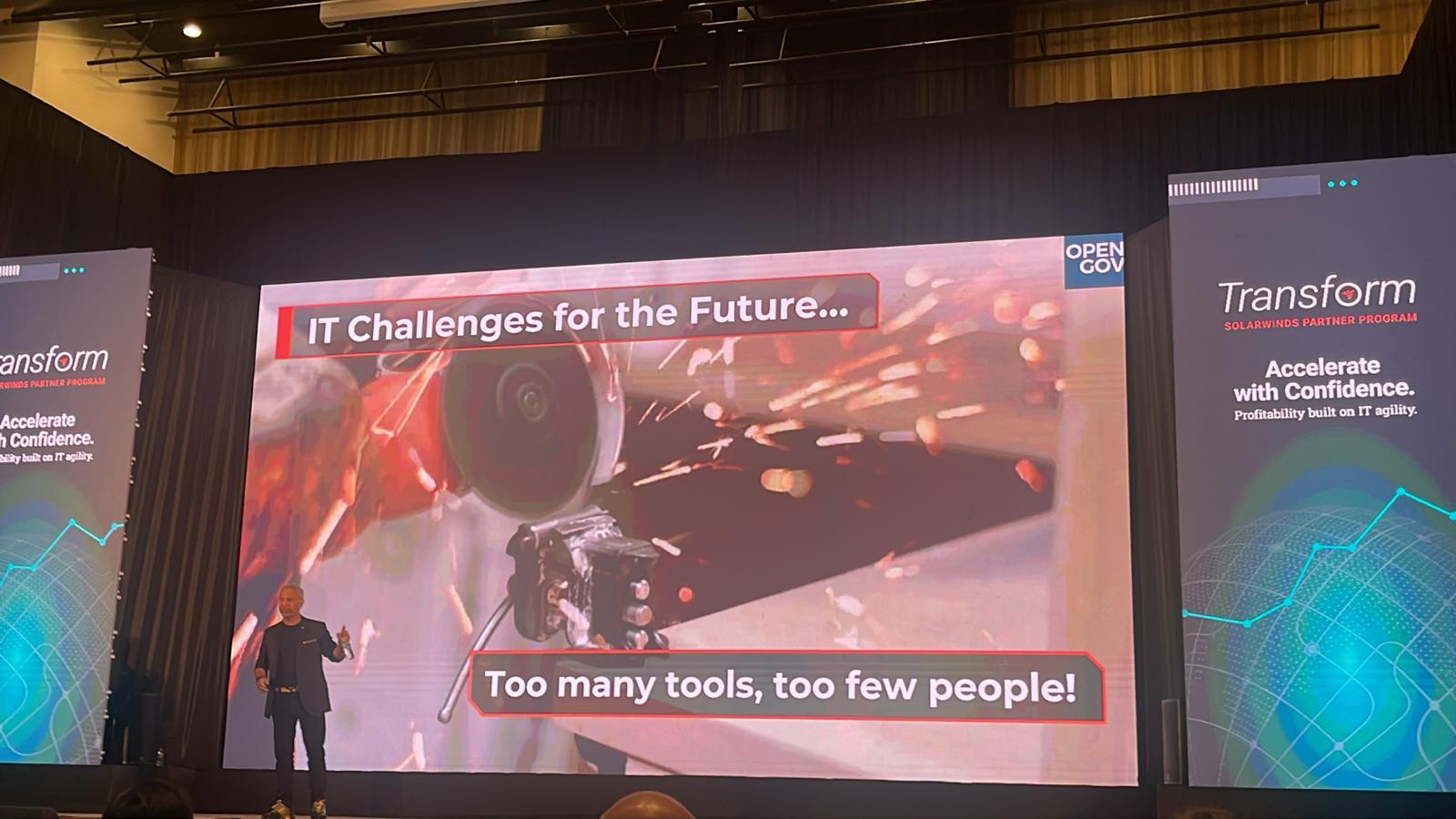 He pointed out eight crucial factors that will help leapfrog APJ. These are the rise of AI and Automation, Internet Penetration and Mobile Adoption, E-Commerce Boom, Rapid Urbanisation and Infrastructure Development, Shift to Cloud Computing, Data Privacy and Security Concerns, Changing Consumer Behaviour, Remote work and Digital Collaboration, and Government Initiatives. Each one of these pillars is accelerating change in the region.
He pointed out eight crucial factors that will help leapfrog APJ. These are the rise of AI and Automation, Internet Penetration and Mobile Adoption, E-Commerce Boom, Rapid Urbanisation and Infrastructure Development, Shift to Cloud Computing, Data Privacy and Security Concerns, Changing Consumer Behaviour, Remote work and Digital Collaboration, and Government Initiatives. Each one of these pillars is accelerating change in the region.
He cautioned that this surge in growth will inevitably breed regional competition. As an illustration, he pointed to Taylor Swift’s exclusivity to Singapore, leaving neighbouring countries in dismay, showcasing how the nation effectively ring-fenced her presence within its borders.
The boom in internet connectivity also designates the region as the next target. While it’s true that everyone is getting connected, with billions of regional openings, it undoubtedly carries a price. The lingering question is: who is responsible for educating these billions that cybersecurity begins at home?
Mohit remarked that the region is undergoing a Terraforming phase, shaping APJ to exemplify the future in both physical and virtual dimensions, with a focus on sustainable development technological advancement, inclusivity and safety at its core.
Mohit urges policymakers and organisational leaders to harness the capabilities of Generative AI effectively in countering cyber threats, stressing the importance of ethical AI development. He suggests a balanced approach that not only enhances cybersecurity measures but also upholds ethical principles, ensuring the responsible use of AI technologies to safeguard digital ecosystems and protect user privacy.
Maximising the deployment of security tools offers a solution to the shortage of staff, enhancing the overall cybersecurity posture. These tools not only empower existing professionals but also promote a more proactive and effective security stance.
Concerns regarding AI in cybersecurity encompass potential privacy breaches, undetectable phishing attempts, and an overall surge in attack volume and velocity. To leverage AI technologies more efficiently, Mohit proposed consolidating AI tools to streamline integration and deployment for businesses.
He recommends implementing advanced observability solutions for all systems to optimise their performance, identify issues, and support continuous improvement. Observability platforms offer elevated visibility and flexibility, substantially strengthening the organisation’s working posture. By leveraging these platforms, businesses can promptly identify and address potential threats with enhanced accuracy and effectiveness, thus enhancing their overall cybersecurity resilience.
“We are fine but vulnerable,” is Mohit’s caveat. “The future of technology lies in the hands of those who prioritise ethical growth, equitable access, and risk mitigation in their endeavours.”
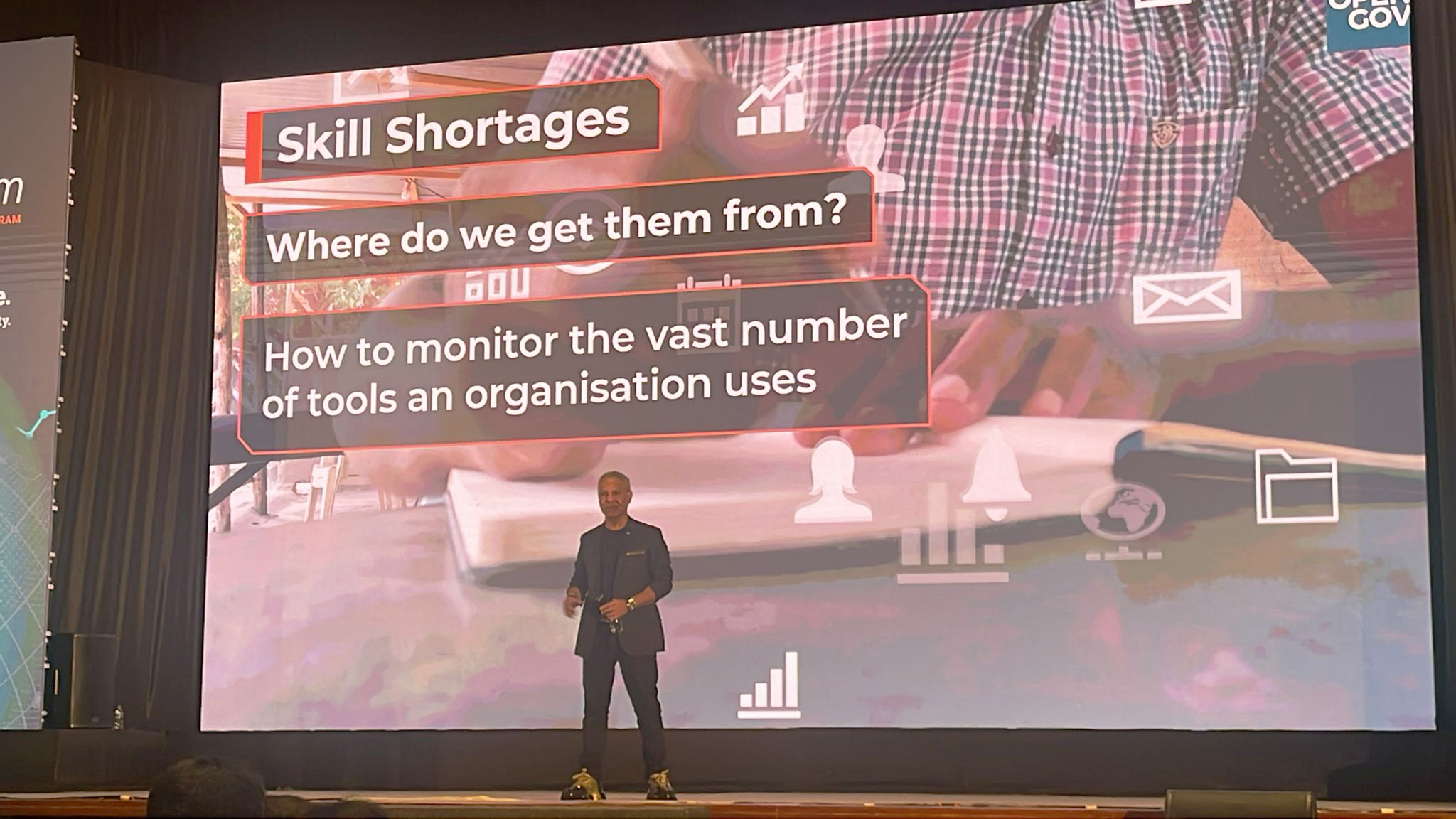 Despite the adverse effects of technology, including job displacement and cybersecurity vulnerabilities, organisations can respond by investing in upskilling their workforce, enhancing cybersecurity measures, and promoting ethical AI development to mitigate risks effectively. By prioritising these initiatives, all sectors can navigate the challenges posed by technological advancements while ensuring responsible and sustainable integration of technology into their operations.
Despite the adverse effects of technology, including job displacement and cybersecurity vulnerabilities, organisations can respond by investing in upskilling their workforce, enhancing cybersecurity measures, and promoting ethical AI development to mitigate risks effectively. By prioritising these initiatives, all sectors can navigate the challenges posed by technological advancements while ensuring responsible and sustainable integration of technology into their operations.
Mohit also advocates strongly for partnerships, urging each partner to become a change agent, spreading awareness and explaining technology as it remains misunderstood by many. He urges them to actively disseminate knowledge and demystify technology, recognising that its complexities are often difficult to embrace and adopt by a significant portion of the population.
Mohit believes that platforms, like the SolarWinds Transform Partner Summit, underscore the imperative of responsible and ethical technology use, echoing his advocacy for harnessing technological advancements for societal betterment. It acknowledges the importance of collaboratively tackling sustainability and regulatory hurdles, stressing the necessity of proactive measures to address potential adverse effects.
The significance of fostering collaboration among governments, industries, and civil society cannot be overstated when it comes to establishing environments that both encourage innovation and mitigate potential risks associated with emerging technologies.
By working together, these stakeholders can develop comprehensive regulatory frameworks that strike a balance between fostering innovation and safeguarding against potential harm. This collaborative approach not only builds trust in AI technologies but also lays the foundation for their long-term success by ensuring they are deployed ethically and responsibly.
“Innovation and regulation must work together hand-in-hand to guarantee that technologies are not only developed but also utilised responsibly,” Mohit is convinced. “This symbiotic relationship ensures that advancements in technology are guided by ethical principles and legal frameworks, fostering a safer and more equitable digital landscape for all stakeholders involved.”
As APJ embraces digital terraforming to reshape its economic terrain, collaboration, and strategic partnerships emerge as key drivers in charting a sustainable and secure future in the digital age. Through collective action and forward-thinking strategies, APJ stands poised to harness the power of technology for societal betterment and economic prosperity in the years to come.
The SolarWinds Transform Partner Summit APJ serves as a beacon of hope amidst global uncertainties, providing an opportunity for industry leaders to navigate the complex digital landscape with resilience and innovation.
[i] The Diplomat, Feb 2023
[ii] invenioIT, July 2023
















